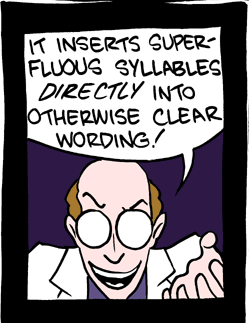Quadrilingual Garbage
This notice on the window of a shop selling a very special type of life-extending egg in Hakone, Japan vies for the worst signage translation we've ever seen.
Read the rest of this entry »
This notice on the window of a shop selling a very special type of life-extending egg in Hakone, Japan vies for the worst signage translation we've ever seen.
Read the rest of this entry »
Google Books isn't the only outfit that sometimes has trouble with metadata. I happened to notice this morning that Oxford University Press has classified Herbert A. Simon's "On a class of skew distribution functions" (Biometrika 43:425-440, 1955) as "Religious Studies..Death":
Read the rest of this entry »
A commenter named bloix here on Language Log recently pointed out yet another case of passive allegations:
First Read, a reliable purveyor of Beltway conventional wisdom, tries out the passive voice: "As for the media, we've allowed this story over race [to] bury one of the more consequential weeks of Obama's presidency thus far (the financial reform legislation becoming law, Senate passage of the jobless benefits, and Kagan clearing the Senate Judiciary Committee). Whether it's Sherrod, Gates, or Jeremiah Wright, the topic of race pushes the media's buttons like no other issue."
The facts: there are seven verbs between the quotation marks, and not a single one of them figures in a passive construction. Yes, zero for 7 (following zero for 4 here and zero for 5 here). If passives were UFOs, the country would be frantic over all the sightings, but the Air Force wouldn't be scrambling any jets.
Read the rest of this entry »
Karen M. Davis sent me this (I've edited slightly, but this is basically a guest post by her):
A story in the Minneapolis Star Tribune displays a fine if rather inexplicable example of obscenity avoidance:
A man who got between a guy and the woman he was hitting says:
"I just simply say, 'Dude, that's enough,' [thinking] maybe he'll back off," Skripka said. "He got in my face. I didn't flinch. I said, 'Dude, back off,' pardon my French but that's the words I used. Then I finally said, 'Dude, what's your problem?' The next thing I know is I'm waking up on a gurney. I was knocked out cold."
"Dude, back off" requires the familiar "pardon my French" apology for obscenity? Somehow I don't think that's the words he used!
Read the rest of this entry »
 Reader JL sent this picture, with some questions:
Reader JL sent this picture, with some questions:
First of all, there's the word "jegging." A quick search tells me that it's a cross between "jeans" and "leggings." I might have been able to figure that out myself if they had gone with "jeggings"–but "jegging"? That sounds like some novel form of crime. ("I totally got jegged last night!")
But then there's also the "live in" part. Presumably this is an exhortation to wear your jegging all day and thus "live in" it. But when I first saw this I read it more in the "live in Tokyo" sense.
Or maybe the "live-in housekeeper" sense? Amazingly enough, "live in jegging" isn't yet indexed by Google or Bing, so you lucky readers get first shot at figuring out what this means.
Consider this passage from Kate Lahey, "DJs case will be a watershed", The Age, 8/4/2010, sent in by an alert reader:
Margaret Thornton, a law professor at the Australian National University specialises in discrimination law and policy.
She says the high profile of this {sexual harassment] case would undoubtedly encourage other women to speak out. […]
The $37 million message is also likely to resonate with employers, Thornton says.
"A huge percentage of women, if not most, have actually been subjected to some form of sexual harassment in the workplace … this is going to have an enormous ramification."
Read the rest of this entry »
My piece on Sarah Palin’s refudiate — “Got to celebrate it!” — is on Fresh Air today (weirdly edited and repunctuated on the NPR site but fixed now). I noodle over why Palin never cottoned to the error before she was caught called out and felt obliged to defend it: probably because repudiate is an item that you're most likely to encounter in books with semicolons in them. (I wanted to call the piece "Never a Duh! Moment" but NPR likes titles that tip their hands.) In the end, though, I was more interested in the keening indignation that these things evoke among the logotariat (can’t find any other hits for that one, but a claim of first coining requires more intense Zimmering than I’m capable of). It's a point that has been made before in these pages, particularly by Mark (for example here, here, and here); I defended Palin against the de-haut-en-bushwah (Ben?) condescension of her critics here and here. But it isn't as if it doesn't still need saying:
Take the way the logotariat reacted to Palin's use of "verbage" in place of "verbiage" during the 2008 campaign. It's a very common error, and in its way a logical one. The "i" in "verbiage" doesn't make any sense if you think, as most people do, that the word is related to "verb" and "verbal." (It actually comes from the same root as "warble.") But in The New Yorker, James Wood took "verbage" as Palin's own invention, calling it a perfect example of the Republicans' disdain for words: "so close to garbage, so far from language."
"Where do you begin with that? With the remarkable condescension of "garbage" (so close to "trash")? Or with the insolence of asserting that faulty usage betrays stupidity and turpitude?
Read the rest of this entry »
Adam Kilgarriff, writing at the Macmillan Dictionary Blog:
An idea that has been provoking widespread interest in applied linguistics circles in the last few years is ‘English as a Lingua Franca’, ELF for short. There are now many circumstances where non-native speakers of English, of different language backgrounds, all accomplished English speakers, work together or do business in English. There are often no native speakers present, and even if there are, it is not clear that their perspective on the language has any special status. Communication can successfully be achieved, in English, without reference to the native speaker, and the ELF research agenda is to explore ELF and see if it has linguistic characteristics that set it apart as a distinct variety of English.
Read the rest of this entry »
The Associated Press obituary for Mitch Miller includes this highly questionable tidbit:
Miller's square reputation in the post-rock era brought his name and music to unexpected places… During Queen's nonsensical camp classic, "Bohemian Rhapsody," the group chants "Mitch MILL-uh!" as if to affirm the song's absurdity.
Surely that's a mondegreen. The AP would have been well-served to consult Am I Right or Kiss This Guy, online repositories of misheard lyrics. It's not "Mitch Miller" that Queen is singing, but bismillah, the formulaic utterance in Classical Arabic that introduces each sura (chapter) of the Qur'an. (It means "In the name of God"; the full formula is bismi-llāhi r-raḥmāni r-raḥīm, "In the name of God, Most Gracious, Most Merciful.")
Read the rest of this entry »
Thanks to several commenters on our recent most-a-thon ("Most", 7/31/2010; "Most examples", 7/31/2010; "Most and Many", 8/1/2010), I've learned about an interesting literature on the semantics, pragmatics, and psycholinguistics of most, which I think is worth collecting in one place for those unexpectedly unobsessive readers who don't repeatedly scan and cross-classify the comments on this kind of Language Log posting sequence.
These publications provide a variety of (mostly perceptual) evidence for the view that most really does mean "more than half", while offering a greater variety of theories about the strategies that (different sorts of) people use to determine whether this is true in particular cases.
Read the rest of this entry »
 Zach Weiner's most recent Saturday Morning Breakfast Cereal reveals an invention that may allow Big Science to complete the transition to assembly-line methods.
Zach Weiner's most recent Saturday Morning Breakfast Cereal reveals an invention that may allow Big Science to complete the transition to assembly-line methods.
But for me, this strip raised an iconographic question: when did white lab coats become the comic-strip uniform of scientists? And when this convention arose, which scientists actually wore white lab coats? Because these days, it's not easy to find an actual scientist (as opposed to one in a comic or an advertisement) who wears (or even owns) one. [OK, I yield to the commenters who observe e.g. that "in … biomedical research, maybe a third of the researchers wear lab coats whenever they're at the bench". Let's just say that a fairly small minority of scientists (and engineers and other inventors) wear white lab coats, and leave it at that.]
Read the rest of this entry »
Another problem of attributional abduction, this one from Josh Marshall, "So How'd it go?", TPM 7/31/2010:
Our reporting duo gives us the round down of just what happened at today's pro-diversity 'Uni-Tea' Tea Party rally in Philadelphia.
Read the rest of this entry »